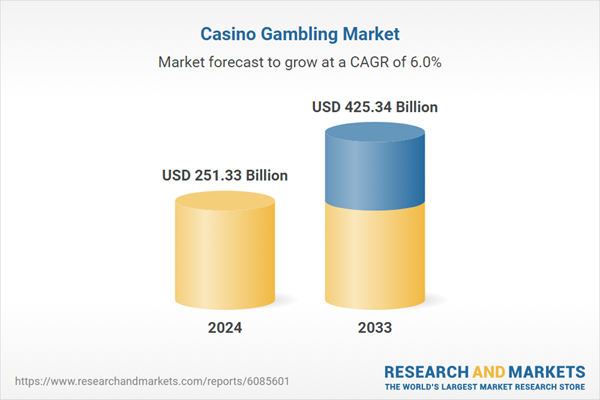Market Overview
The global casino market is anticipated to grow from USD 251.33 billion in 2024 to USD 425.34 billion by 2033, reflecting a CAGR of 6.02%. Factors driving this growth include the legalization of gambling, advancements in technology facilitating online and mobile platforms, and increasing disposable incomes. Additionally, regulations are improving safety and market conditions, while the adaptation of cryptocurrencies is enhancing the industry landscape. Significant investments from leaders like MGM Resorts and the expanding markets in the U.S., UK, India, and UAE are indicative of noteworthy market evolution, with venues offering diverse experiences well beyond conventional gambling.
Market Report Details
Dublin, July 29, 2025 (GLOBE NEWSWIRE) — The “Casino Gambling Market Size and Share Analysis – Growth Trends and Forecast Report 2025-2033” report has been included in ResearchAndMarkets.com’s offerings. This analysis indicates the casino gambling market is poised to reach USD 425.34 billion by 2033, growing from USD 251.33 billion in 2024.
Drivers of Growth
The significant expansion of the global casino gambling market can be attributed to various elements, including the rise of internet gaming, increased tourism, and enhanced consumer spending power. Traditional casinos remain crucial for high-stakes and leisure gambling, particularly in renowned locations such as Las Vegas, Macau, and Monte Carlo. To broaden their appeal, these establishments are augmenting their offerings with fine dining, entertainment, and luxurious accommodations.
Digital Currency and Technology
The rise of digital currencies and blockchain technology is also influencing the industry, providing innovative payment solutions and enhancing transparency. The casino sector is expected to further evolve as consumer preferences and technological advancements contribute to making it increasingly attractive for investors.
Challenges Facing the Industry
Despite growth potential, the casino gambling sector grapples with several challenges, including gambling addiction and competition from online platforms. Operators need to implement responsible gambling measures, such as counseling and self-exclusion programs, to mitigate the risks associated with addiction. Furthermore, as online gambling grows, traditional casinos must innovate to retain their market share.
Conclusion and Future Outlook
The global casino gambling market is on a path of significant transformation fueled by legalization, social acceptance, and technological advancements. Industry leaders are poised to adapt and thrive in this dynamic environment, with the potential for lucrative opportunities as the landscape continues to evolve.



